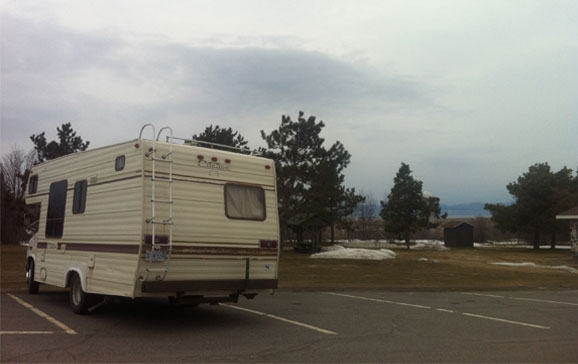Day 90 – 45.6 km (total – 2088.5 km)

At a rest stop for the night, overlooking the St. Lawrence. And hoping we don’t get the boot as we’re not supposed to park overnight!
Today was a good running day. Legs felt good. Nice temperature to run in. And I got pulled over the police for the second time in a week. Apparently you’re not allowed to run or cycle on the TCH in Quebec. Well… not entirely true. The officer told me that the RV could drive behind me with the flashers on and that would be ok. I wasn’t interested in arguing, but I am a good 14 feet away from traffic while the RV would be just feet away from the lane of speeding vehicles. Rules are rules… for now at least! There is a secondary highway that runs parallel to the TCH and actually hugs the St. Lawrence River as well, so it might be a welcome change for a couple of days.
I read a book a couple of years ago called Ecological Literacy. It’s a collection of various writers who talk about educating children in North America. I just wanted to share a short passage from Michael Ableman. He is a farmer, writer, photographer, organizer and educator. I’m not posting this to advocate what he’s saying… rather to spark some more thoughts about our education system. Simply some food for thought…
Schools and farms have become a lot alike. They have both become factories, with assembly-line controls and engineered inputs, cranking out either grades and test scores or ‘food’.
The industrialization of our food system and the industrialization of our education system treat us all as if we are just consumers, passively waiting to be fed disconnected information or prepackaged food. But we cannot insure the well-being of our children or the future in this way. Raising whole young people is like raising good food. It is a sacred practice; it requires waking each day and seeing things anew, responding to the moment, listening, paying attention, observing.
We can push our kids, and grade them, and judge them, and try to fit them into boxes, just as we design tomatoes more so that they will fit into shipping boxes than for taste or nutrition. But real learning and education will only come, I believe, when they are allowed to develop at their own speed, given good nourishment, and provided with a sense of belonging and place and some connection to the natural world.
Imagine what kind of world we could create if every junior high school student in North America learned about soil, about health and nutrition, about the physical environment in which they live. Shouldn’t they learn to grow their own food, make heir own clothing, build a structure, and cook, and shouldn’t their education include community service?
These skills are not just about developing self-sufficiency. They provide young people with a sense of being rooted in the real world, not just hooked up to a computer screen. Most of all, their minds and imaginations and creative spirit will stay alive when we, each of us, whether or not we teach and whether or not we have kids, treat them with respect and give them love. Maybe we could start using the word “love” more in talking about education – and about growing food.”




